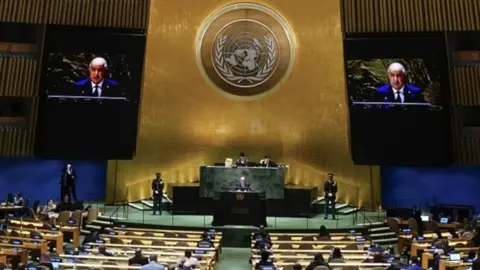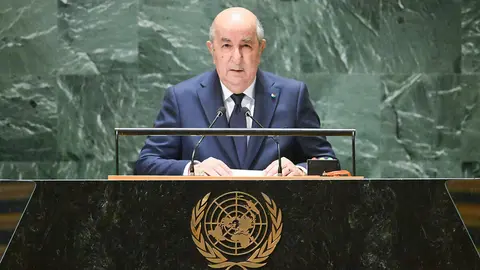Tebboune organises the services of the presidency: to what end?

Since his arrival at the El-Mouradia palace, Abdelmadjid Tebboune has been content to have the presidency run by advisers with little or no experience. Many of them were appointed through nepotism and cronyism. The result is well known. A series of failures punctuated by a monstrous gaffe on the podium of the UN General Assembly, which made Tebboune the laughing stock of the world.
After four years of blind navigation and no organisation whatsoever, the Algerian president has finally resolved to bring some order to the El-Mouradia palace. But this is not an exact science. He did not have to invent a butter knife. It was enough to re-establish the structures that existed in the 1980s, in the time of Chadli Benjedid, and that was it. This was undoubtedly the suggestion of Abdelaziz Khellaf, former Finance Minister and adviser to Chadli Benjedid.
Thus, on reading "Presidential Decree no. 23-331 of 26 September 2023 on the reorganisation of the services of the Presidency of the Republic", the informed observer will find practically the same organisational chart as that of Chadli Benjedid, whose architect was none other than General Larbi Belkheir, who had drafted a text that allowed the distribution of powers between the two strong men of the Presidency at the time, Mouloud Hamrouche, then Secretary General of the Presidency of the Republic, and Larbi Belkheir, Director of Cabinet. The latter had a certain advantage.
Today, things are very different. Instead of Hamrouche and Belkheir, we find Abdallah Moundji and Larbaoui Nadir. Two modest men without stature. Like their boss, they are far from equalling the late Chadli Benjedid, also appointed by the military in 1979, but who did not come from nowhere. He was the second highest-ranking officer (colonel) after Abdellah Belhouchet, head of a military region and member of the Revolutionary Council, the country's highest governing body during the 13-year reign of the late Houari Boumediene. In addition to his status as a former moudjahid (veteran of the war of liberation).

The men called upon to fill the posts in the organisation chart were also big names. Suffice it to mention Colonel Mohamed Mediene, known as Tewfik (who a few years later became the powerful head of the Intelligence and Security Department for a quarter of a century), Ghazi Hidouci, one of Algeria's most eminent economists, and Mourad Goumiri, to name but a few.
The organisation chart that Abdelmadjid Tebboune has taken over is heavy. Very heavy. It is a parallel government that will allow the president to keep a close eye on government activity and intervene if necessary to make the necessary adjustments.
Judging by the missions assigned to the future advisors and the two chiefs appointed to lead the two acting teams, it is easy to see why.
- They are to "supervise and participate in the implementation of the programme, policies and decisions of the President of the Republic and report to him". To this end, they monitor economic affairs, government activities, and political and institutional issues, and report on developments.
- Assist the President of the Republic, if necessary, in the exercise of his constitutional prerogatives and responsibilities.
- Organising and supporting the activities of the President of the Republic.
- Supervising government activity, examining the activities of the institutions and bodies under the authority of the President of the Republic and reporting to the President of the Republic.
- Informing the President of the Republic on the political, economic, social and cultural situation and developments in the country and providing him with the data necessary for decision-making.
- To carry out all studies relating to political, economic, social, cultural and energy issues, to promote their implementation and to evaluate their impact.
These missions, as specified in Article 4 of the presidential decree, do not give their executors "the vocation to replace the competent institutions and administrations, nor to interfere in the exercise of their attributions". This means that their role is one of control and surveillance.
Hence the need to create solid and stable structures, staffed by competent and, above all, courageous people, to ensure that their vision is accepted by political decision-makers.
The decree of 26 September endows the Presidency of the Republic with "a cabinet headed by a cabinet director, a general secretariat of the Presidency of the Republic, a general secretariat of the government whose powers, organisation and functioning will be determined in a specific text, advisers, a general inspectorate of state services and local authorities, placed directly under the authority of the President of the Republic, and whose powers, functioning and organisation will be determined in a specific text".
It is added that "the Presidency has a special secretariat and all the bodies and structures of the Presidency of the Republic". A final filter is thus placed between the President and the two pilots of the new structures, the Director of Cabinet and the Secretary General. The latter will have as instruments "organs, structures, heads of mission, directors of studies, directors, heads of studies and synthesis, deputy directors, heads of studies, as well as administrative and technical staff". It is added that "for the performance of their functions and tasks, the advisers and the private secretary may be assisted by project leaders, research directors, research and synthesis managers, heads of research and administrative and technical staff".

The division of tasks between the chief of staff and the secretary general is almost identical to that of the organisation that functioned during Chadli's reign.
The duties of the Chief of Staff of the President of the Republic will include "studying and implementing political and international relations issues", "monitoring government activity, analysing it and informing the President of the Republic", "monitoring public opinion on major decisions", "preparing and coordinating communication activities aimed at publicising the guidelines and orientations of the President of the Republic and his activities", "supervising relations with the national and foreign media", etc.
The director of the Private Office of the President of the Republic is also responsible for "supervising the processing and analysis of requests from investors, economic operators and other special requests, in coordination with the advisors".
To carry out this task, the Head of Cabinet "has at his disposal the Requests Department referred to below, which is responsible for centralising, receiving and analysing requests and monitoring the status of their execution. To this end, it keeps a file of requests and draws up monthly statistical reports".
Four directorates of the Presidency are attached to the Cabinet. These are the Directorates-General for Protocol, Communication, Requests and Interpretation, Translation and Calligraphy. It is easy to see that the President of the Republic delegates a large part of his powers to his chief of staff. This is what once gave Chadli the nickname "the lazy king".
According to the new text, the secretary general will be in charge of eleven Directorates General, including Presidential Security and Protection, Communications and Telecommunications Security, the National Archives, and so on.
He will also be responsible for "determining and implementing the procedures and methods for the appointment of senior officials and civilian functions" and for "organising and directing the departments of the Presidency of the Republic".
Except for a few details, this is the same configuration as the organisation chart of the Chadli Benjedid years. An organisational chart that will take a long time to see the light of day, especially at a time when competencies are in short supply. Skills have been absent for a long time. Some have been forced to leave the country.
However, the question that has been repeated as a leitmotiv since the announcement of the signing of this decree revolves around the relevance of this decision: why wait four years to think about organising the services of the Presidency of the Republic? What was Tebboune's intention in doing so? Will he have time to carry out this project and will he find the men willing to stick their necks out with an unpopular regime that is in danger of collapsing at any moment? Do the two men charged with taking on the responsibilities set out in the decree of 26 September have the capacity to cope with these heavy burdens? The former handball international and Algerian representative to the UN, Nadir Larbaoui, is by no means destined to play the role that General Larbi Belkheir carved out for himself when he was the real boss in El-Mouradia. With his charisma and subtleties, Chadli's former chief of staff, nicknamed the Cardinal, was the cornerstone of the Algerian political system and its main architect.

As for the current Secretary General of the Presidency, Abdallah Mounji, appointed to the post on 9 September 2022 after a brief stint as head of the Ministry of Transport from March to September 2022, he is unknown on the Algerian political scene and in the corridors of power. He cannot be compared to Mouloud Hamrouche, a former young officer of the national liberation army whose entire family had participated in the liberation struggle, former protocol director of the late Houari Boumediene and doctor of law and political science with a thesis on the "military phenomenon in Africa". He was Secretary General of the government before becoming President of the Republic under Chadli. He was head of government from 5 June 1989 to 5 June 1991. The team of advisers he had under his wing when he was SG in the Presidency of the Republic was nicknamed the "team of reformers" for having brought about the reforms that bore the name of Mouloud Hamrouche in the 1990s. Would Abdallah Moundji have the courage and skills of Hamrouche to follow in his footsteps and bring about the reforms that Algeria so badly needs? Let us not dream.
As for the reason for this decree, the question remains open. In any case, it is not with an administrative organisation of the presidency's services that Tebboune could hope to convince the army to bring him back to the head of state. Chadli Benjedid was well equipped with these structures, but that did not prevent Generals Nezzar and Lamari from bursting into his office one morning in January 1992 to force him to resign.











